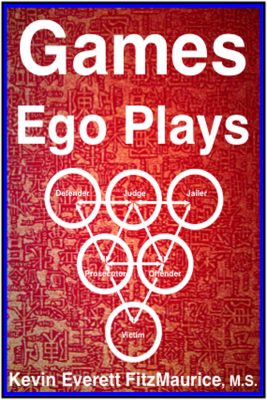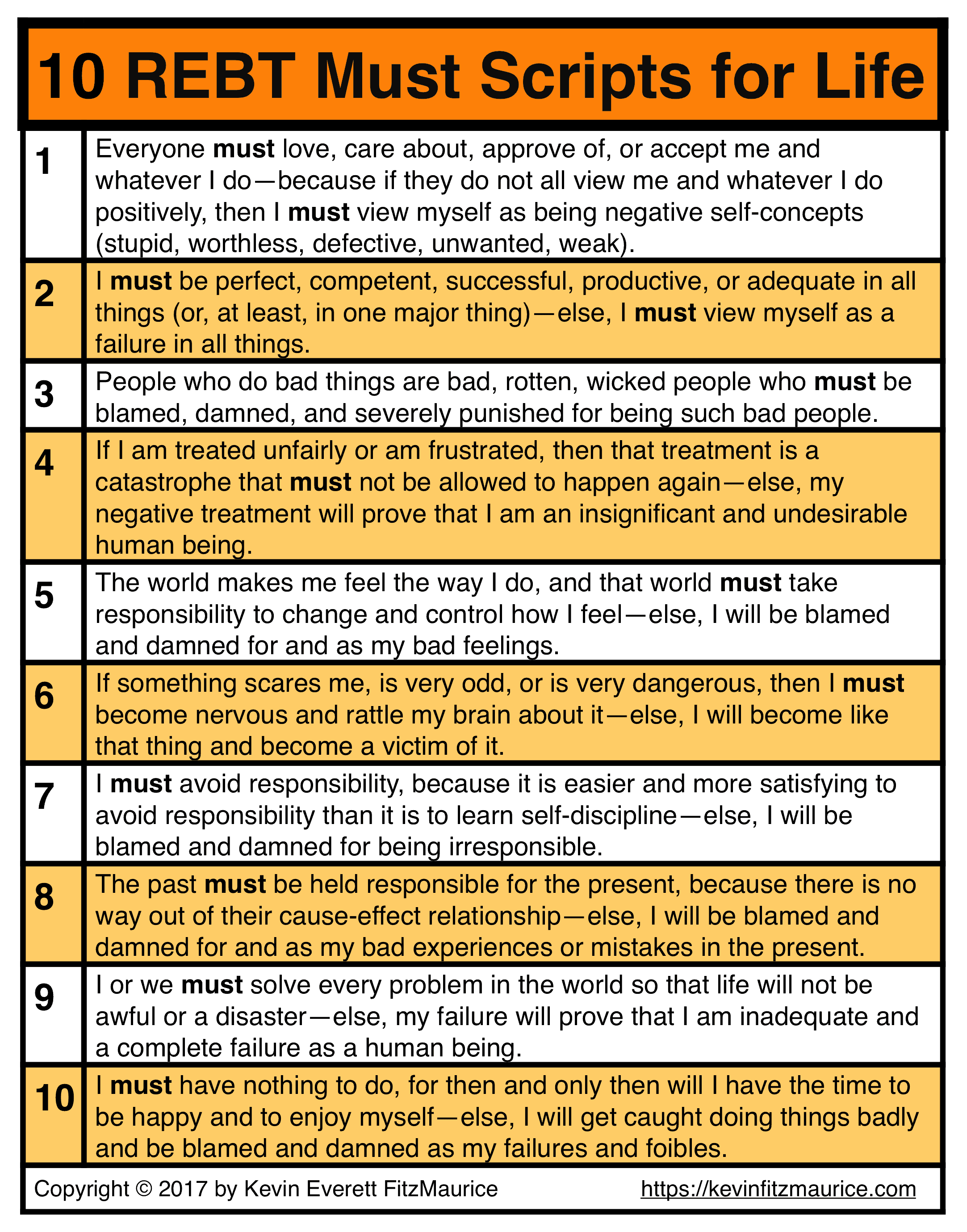Demands1. Predictive2. Conditional3. Empirical4. Advisory5. EmotionalDemands As ScriptsRelated Pages6 Groups of Topics9 Skills & Topics
REBT & 5 Categories of Demands
- Garden will teach you an easy and effective Cognitive Behavioral Therapy (CBT & REBT) system.
- REBT practitioners update their practice for greater effectiveness and efficiency with Not.
“To understand the actual world as it is, not as we should wish it to be, is the beginning of wisdom.” —Bertrand Russell
“There are three musts that hold us back: I must do well. You must treat me well. And the world must be easy.” ―Albert Ellis
Shoulds, Musts, Oughts, & Demands
- REBT teaches that demands are a psychological problem because they cause undue stress and self-defeating behaviors.
- The trigger words for demands (must, should, ought, have to, got to, had better) are not always demanding anything.
- Before considering a demand a problem, find out if the demand is convenient, practical, rational, or realistic.
Page Note
- The idea for this page came from reading an REBT manual for counselors.
- The best guess is that it was found in the following book:
- Walen, Susan R., Raymond DiGiuseppe, and Windy Dryden. A Practitioner’s Guide to Rational-Emotive Therapy, Second Edition. Oxford University Press, New York. 1992.
- Read and discover the best diagrams and maps of how people play games with your mind and heart.
1. PREDICTIVE (Sherlock or Detective)
- Predictive shoulds help us to plan and prepare.
- Predictive shoulds do not themselves cause a psychological disturbance.
Examples
- The train is scheduled for noon, and this train line is pretty consistent, so the train should be here any minute since it is almost noon.
- That car pulling into our driveway must be your father getting home from work because this is his usual time to arrive home.
- I should get that job tomorrow because they are calling me back for a third interview, and my friend there said they never do that.
- Read and master the life skill of acceptance using the best combination of CBT, REBT, & Stoicism.
2. CONDITIONAL (Coach or Parent)
- Conditional shoulds help us to understand requirements and necessary conditions.
- Conditional shoulds do not themselves cause psychological disturbances.
Examples
- If you want to do better at chess, then you have to play more and play better players.
- If you really want to learn to fly an airplane, then you should join the Air Force or save money for private lessons.
- If you want to get a college sports scholarship, you must practice more than you have been practicing so far.
- Read and master the life skill of acceptance using the best combination of CBT, REBT, & Stoicism.
3. EMPIRICAL (Scientist or Seeker)
- Empirical shoulds are based on logic and experience such that the order of events is well-defined.
- Empirical shoulds do not themselves cause psychological disturbances.
Examples
- If you cross those wires while installing that light switch, then you should get a severe electrical shock.
- You must not neglect to maintain the elevator equipment because that will result in the failure of the elevator.
- If you mix those two chemicals together in just the right proportions, then you should end up with the required compound.
- Read and master the life skill of acceptance using the best combination of CBT, REBT, & Stoicism.
4. ADVISORY (Counselor or Guide)
- Advisory shoulds are designed to encourage us to act proactively for our own good.
- Advisory shoulds do not themselves cause psychological disturbances.
Examples
- You should read some books on assertiveness training to help yourself learn to speak up more.
- You should go to college and earn a degree in engineering because you have the aptitude for it.
- You should pick a field of study and focus on it because right now, you are scattered and getting nowhere.
- This focus should help you narrow down your goals by helping you understand more about one field of study at a time.
- Remember, you still have time to change your focus if you start to focus now.
- Read and master the life skill of acceptance using the best combination of CBT, REBT, & Stoicism.
5. EMOTIONAL (Self-Esteem or Ego)
- Emotional shoulds exist to safeguard and reward the ego (pride, self-esteem).
- Emotional shoulds do cause psychological disturbances.
Examples
- I must be first in my class, else it is horrible because then I am a loser.
- You must love me, or else I can’t stand to live because I must be worthless.
- School has to be easier, else it is just not fair because it makes me look stupid.
- Read and master the life skill of acceptance using the best combination of CBT, REBT, & Stoicism.
Demands as Scripts & Rules for Life
- 10 Demands that do cause psychological disturbance.
- Information on REBT.
Related Pages of Free Information
- 4 Ways “Musts” Cause Stress
- CBT, CT, & REBT Cognitive Psychotherapies: List Pages
- Coping Skills: Free Help
- Counseling Issues: Free Help
- Ego & Self-Esteem Fast-Facts
- Emotional Responsibility: List Pages
- Exercises & Techniques: List Pages
- Feeling & Coping: Fast-Facts
- “Musts” & Demands Can Be Useful
- REBT (Rational Emotive Behavior Therapy): List Pages
- REBT Website Pages: External
- Self-Esteem Issues: List Pages
- Read and discover the best diagrams and maps of how people play games with your mind and heart.
- Read and master the life skill of acceptance using the best combination of CBT, REBT, & Stoicism.
6 Groups of Topics Menu
- 1. Pages by Topic
- 2. Fast-Facts by Topic
- 3. Quotations by Topic
- 4. Poems by Topic
- 5. Scripture by Topic
- 6. Websites by Topic
- Read and master the life skill of acceptance using the best combination of CBT, REBT, & Stoicism.
- Read and discover the best diagrams and maps of how people play games with your mind and heart.
9 Skills & Topics Menu
- 1. Anger Skills & Topics
- 2. Blame Skills & Topics
- 3. Communication Skills & Topics
- 4. Coping Skills & Topics
- 5. Counseling Skills & Topics
- 6. Praying Skills & Topics
- 7. Recovery Skills & Topics
- 8. Responsibility Skills & Topics
- 9. Thinking Skills & Topics
- Read and master the life skill of acceptance using the best combination of CBT, REBT, & Stoicism.
- Read and discover the best diagrams and maps of how people play games with your mind and heart.



